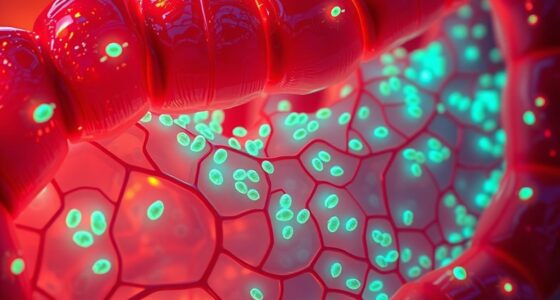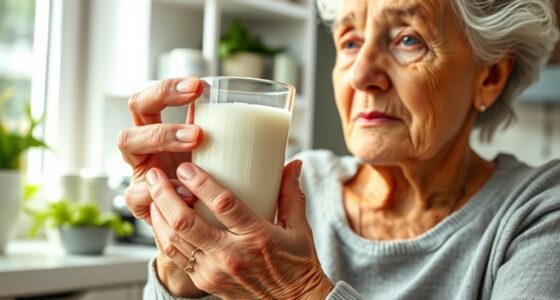Biological age reveals how well your body functions, while chronological age simply counts your years lived. Measuring biological age involves analyzing genetic markers, cellular health, and lifestyle factors like diet, stress, and exposure to toxins. Your biological age can be younger or older than your actual age, giving a clearer picture of your health and aging process. Understanding these differences helps you make smarter choices—continue exploring to learn how to influence your aging journey.
Key Takeaways
- Chronological age counts years lived, while biological age reflects overall health and cellular function.
- Biological age is influenced by genetic markers indicating cellular aging speed and resilience.
- Lifestyle factors like diet, exercise, and stress management can modify biological age independently of chronological age.
- Measures such as genetic tests and biomarkers help assess biological age more accurately than calendar years.
- Understanding the difference guides personalized health strategies to improve aging quality and lifespan.

Understanding the difference between biological and chronological age is essential because they often tell different stories about your health and importance. Chronological age is simply the number of years you’ve been alive, but biological age reflects how well your body functions compared to typical standards for your age group. This distinction matters because your biological age can be influenced by various factors, offering a more accurate picture of your overall health and aging process.
Biological age reveals how well your body functions, providing a more accurate health picture than just your chronological years.
Genetic markers play a vital role in determining your biological age. These specific DNA sequences or variations can indicate how quickly or slowly you’re aging at a cellular level. For example, some genetic markers are associated with increased inflammation or weakened cellular repair mechanisms, which can accelerate biological aging. Conversely, other markers suggest a more resilient cellular profile, implying a younger biological age. By analyzing these markers, scientists can gauge your body’s true age and predict potential health risks more accurately than just counting your years.
But genetics isn’t the only piece of the puzzle. Lifestyle factors profoundly influence your biological age as well. Your daily habits—such as diet, exercise, sleep, stress management, and exposure to toxins—can either slow down or speed up your biological aging process. For instance, a balanced diet rich in antioxidants and regular physical activity can enhance cellular health, potentially making your biological age younger than your chronological age. On the other hand, smoking, excessive alcohol consumption, chronic stress, and insufficient sleep can accelerate aging by promoting inflammation and damaging cells. These lifestyle choices directly impact genetic expression and cellular health, demonstrating how your daily behaviors shape your biological age.
Furthermore, the way you manage oxidative stress and inflammation plays a crucial role in your biological aging process, emphasizing the importance of a healthy lifestyle. Understanding this interplay between genetics and lifestyle empowers you to take control of your aging process. If tests reveal your biological age is substantially older than your chronological age, you can implement targeted lifestyle changes to improve your health outlook. Conversely, if your biological age is younger, it’s a sign to maintain healthy habits and continue prioritizing your well-being. Recognizing that your biological age isn’t fixed encourages proactive steps, emphasizing the importance of lifestyle choices alongside your genetic predispositions.
In essence, measuring biological age offers a more nuanced view of your health than simply considering how many years you’ve lived. By paying attention to genetic markers and adjusting lifestyle factors, you can influence your aging trajectory, potentially extending your healthspan and enhancing your quality of life. This understanding underscores that aging isn’t just about time but about how well your body ages—an empowering realization that encourages you to take charge of your future well-being.
Top picks for "biological chronological measur"
Open Amazon search results for this keyword.
As an affiliate, we earn on qualifying purchases.
Frequently Asked Questions
Can Lifestyle Choices Influence Biological Age?
Yes, your lifestyle choices can influence biological age. By making lifestyle modifications like eating well, exercising regularly, and avoiding smoking, you can positively impact aging biomarkers. These changes help slow down cellular damage and improve your overall health, making you biologically younger than your chronological age. Consistent healthy habits foster better organ function and reduce disease risk, allowing you to age more gracefully and maintain vigor longer.
How Accurate Are Current Biological Age Tests?
Current biological age tests vary in accuracy, but generally, they provide a decent estimate thanks to advances in biomarker validity and testing reliability. You can trust these tests to reflect your biological condition, but remember, they aren’t perfect indicators. Factors like lifestyle and genetics can influence results. So, while they’re helpful tools, don’t rely solely on them; use them alongside other health assessments for a clearer picture.
Is It Possible to Reverse Biological Aging?
Yes, reversing biological aging is possible through methods like hormonal therapies and telomere extension. Hormonal therapies can help restore youthful hormone levels, improving your overall health, while telomere extension targets the aging cells directly, potentially slowing or reversing cellular aging. Although these treatments show promise, they’re still under study, and you should consult a healthcare professional before pursuing any anti-aging interventions.
What Are the Main Factors Affecting Biological Age?
You influence your biological age through factors like lifestyle, stress, and environment. Epigenetic markers, which change with your habits, play a vital role in aging, while cellular senescence contributes to tissue decline. By maintaining a healthy diet, exercising regularly, managing stress, and avoiding harmful habits, you can positively impact these factors and potentially slow down your biological aging process.
How Does Genetics Impact Biological Versus Chronological Age?
You might think genetics only influence hereditary traits, but they also shape your biological age through genetic markers. These markers indicate how quickly your cells age, affecting your overall health and longevity. While your chronological age is fixed, your biological age can be influenced by your genes, making you appear younger or older. So, understanding your genetic makeup helps you better manage aging and maintain vigor longer.
Conclusion
Remember, age is just a number, but how you age is what truly counts. By understanding the differences between biological and chronological age, you can take better charge of your health and well-being. While chronological age measures time, biological age reflects your body’s true condition. So, don’t just count the years—make those years count. As the saying goes, “You are as old as you feel,” so focus on aging well, inside and out.









